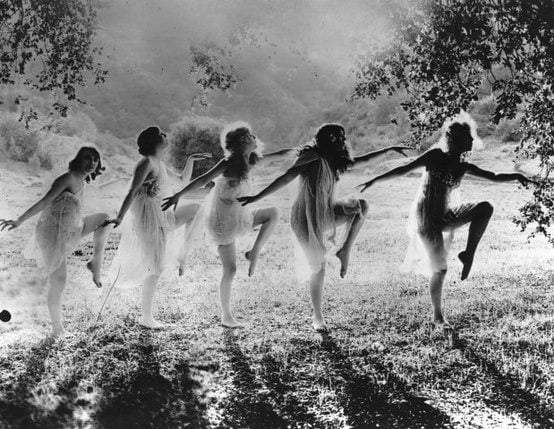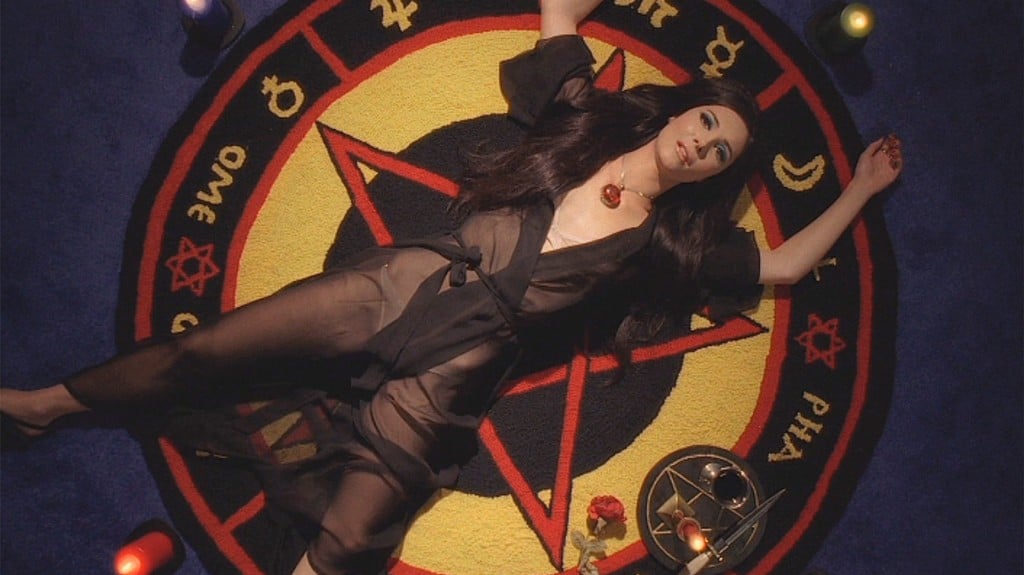I mean, DUH.
The modern pagan revival, birthed in England in the early 1950s and making its way Stateside by the mid-1960s (more or less), occurred at a time of social upheaval and turbulence unequaled in the 20th century. Despite neo-paganism’s emergence in England within a fairly conservative sociopolitical population, its equivalent in the United States was seen as an outgrowth of increasingly liberal social mores: the Civil Rights movement, the women’s liberation movement, the sexual revolution, the counter-culture, the anti-war protest movement, the growing interest in Eastern mysticism (which also paved the way for the New Age movement which started heating up in the late 1970s), and, perhaps most significantly of all, the Back to the Land movement.
 Environmental activism was galvanized by the book Silent Spring by Rachel Carson, which described in haunting detail the impact of the use of pesticides and herbicides on the air, land and waterways of the US (many of them developed for use as defoliants in the 1950s by the US military). The institutionalization of widespread consumer waste was a result of the enormous boom in housing and industry that occurred as the post-war Baby Boom was in full swing. Growth cannot come without such a price, it seems (look at China now, poised to be the world’s biggest economic power, but at the cost of ruined farmland, poisoned rivers and many sick and displaced rural inhabitants). Concern for the environment was seen as yet another expression of calling attention to the vast array of injustice perpetrated by corporate greed and political control, and the college kids were just as happy to carry signs protesting the use of DDT as they were to burn their draft cards (or their bras) or host sit-ins to protest the atrocities in Vietnam.
Environmental activism was galvanized by the book Silent Spring by Rachel Carson, which described in haunting detail the impact of the use of pesticides and herbicides on the air, land and waterways of the US (many of them developed for use as defoliants in the 1950s by the US military). The institutionalization of widespread consumer waste was a result of the enormous boom in housing and industry that occurred as the post-war Baby Boom was in full swing. Growth cannot come without such a price, it seems (look at China now, poised to be the world’s biggest economic power, but at the cost of ruined farmland, poisoned rivers and many sick and displaced rural inhabitants). Concern for the environment was seen as yet another expression of calling attention to the vast array of injustice perpetrated by corporate greed and political control, and the college kids were just as happy to carry signs protesting the use of DDT as they were to burn their draft cards (or their bras) or host sit-ins to protest the atrocities in Vietnam.
Environmental awareness and activism further increased with the creation of large-scale watchdog organizations like Greenpeace (I worked for them in the late 1980s and in fact this was my first foray into the modern pagan movement), and nature preservation groups like the Sierra Club and the various PIRGs that often focused on environmental problems and possible legislative solutions. Throughout the 1980s and the early 1990s such groups (and smaller more radical ones like Earth First and ELF) staged large actions designed to call attention to oil spills, endangered wildlife, and ocean pollution. Many people involved in the early days of the pagan movement got involved in such activities; most famously, the California author and environmental activist Starhawk, whose books on goddess worship and the rebirth of paganism (The Spiral Dance, Dreaming the Dark and others) became extremely popular. The charitable donations received during the affluent late ’80s-90s helped to cement the reputation of these (mostly non-profit) organizations, who were largely seen to be doing a Good Thing. Donating to environmental charities and other non-profits became a badge of being a Good Citizen. Pretty soon, companies who were directly responsible for environmental disaster and damage got in on the act: like when ExxonMobil decided to become a major underwriter for the Public Broadcasting System. I mean, how could they be evil if they were funding Upstairs, Downstairs?
I recall many pagan organizations struggling to become viable parts of their communities; wanting to be accepted, willing to offer patient and informed answers when asked if they worshipped Satan in the nude, or whatever it was that the wider public believed witches did at the time. Some groups got involved in Earth Day clean-ups, some organized donations to soup kitchens, some worked to help catalyze social change. Part of this seemed motivated by wanting to appear as responsible citizens, on a par with other religious organizations in their communities; and part of it was simply because we cared about the earth, its animals, its well-being, and our own responsibility to be, in one descriptive phrase that resounded widely, Stewards of the Earth.
But all that changed. Not long after the pagan Internet came around.
Because once we were able to buy our books, order our robes and crystals, have lengthy philosophical and magickal discussions, and even engage in ritual, online, we gradually, it seems to me, began to lose sight of (and touch with) the primary directive of being part of an earth-based spiritual movement: the protection and reverence of Mother Earth.
I don’t think this was a massive, singular trend but rather one that has progressively gotten worse as time has gone on. And that is not to say that the onset of a pagan internet has not been a really wonderful thing in many ways (and still is). As one of the founding members of The Witches’ Voice (wow, was it really in 1996???), I know firsthand how the ability to network quickly and easily changed many peoples’ lives for the better; people who has previously felt little sense of community and who may have had trouble gaining access to information about paganism and Wicca. I wrote many articles for the site and felt proud to be part of a growing, burgeoning movement. Heck, I even wrote about environmentalism a number of times! The growing font of information for pagans online was truly astonishing in those days.
But the pagan internet has changed dramatically in the last ten years. The development of various forms of social media and their increasing sophistication (can you imagine the old chatrooms and message boards with the kind of speed, graphics and sound capability we have now?) has seemingly glamoured us into thinking that this movement is one which can be lived and expressed almost entirely in cyberspace. There are now hundreds of thousands of people who identify as “pagan” or “Wiccan” or “Druid” or what have you who have never conducted a ritual out of doors, who have never attended a festival at a campground, who have never planted a garden in honor of the Eternal Return of the Earth Mother in spring. Do they discuss the gods and their ritual practices and spells and theology? Sure! But do they get their hands dirty, in actual dirt?
Not so much. Just as we’re seeing a whole generation of children who don’t really play outside anymore, we’ve become a nation of people who prefer television, video games, surfing the net and other digital pursuits to lying in a hammock with a book, or sitting on the porch with a drink watching the world go by. Pagan kids that come to festivals seems to not know what to do with themselves, separated from their tablets and X-Boxes; and their parents also can’t seem to put their smartphones down even when in the presence of magical energy writ large in the flames of a bonfire or the moving bodies of a ritual. If it’s not shared on social media, did it happen? (That is not a trick question, by the way.)
But, even worse, the pagan community now seems to believe the main purpose of social media is to draw attention to themselves. We’ve become both increasingly insular and spread out, screaming desperately out in the ether to bring traffic to our websites, sales to our Etsy pages, readers to our blogs, likes to our Facebook pages. We don’t read books anymore, because we spend so much more time online or playing with our personal electronic gadgets. Despite feeling more “connected” than ever before, we’re actually more fragmented and isolated. Certainly the average American with a smartphone is increasingly disengaged from the natural world, and the external world in general. The Narcissus Narcosis described by Marshall McLuhan has surely arrived and cast a pall over our society. And what’s more, the current state of pagan discourse has steadily declined; looking at any comment thread online these days shows a definite lack of awareness of our movement’s basic history, texts, literature, liturgy and practices. It used to be a given that most pagans one communed with online were, if not already well-read and informed, were engaged in learning as much as they could. Now, that innate curiosity and intellectual vigor that once defined our movement seems to be in short supply.
 And as for hugging trees…does anyone actually do that anymore? Stand next to a big tree and embrace it and feel its warmth and solid strength, the faint pulse of life at its living core, the deep silence and wisdom beneath its bark? This is a truly healing and eye-opening experience, and I highly recommend doing it on a regular basis. Maybe if more of us were doing this, we’d return to those days when we all thought we could make a difference, that our desire to embrace a spiritual path that revered nature would help make the world a better place.
And as for hugging trees…does anyone actually do that anymore? Stand next to a big tree and embrace it and feel its warmth and solid strength, the faint pulse of life at its living core, the deep silence and wisdom beneath its bark? This is a truly healing and eye-opening experience, and I highly recommend doing it on a regular basis. Maybe if more of us were doing this, we’d return to those days when we all thought we could make a difference, that our desire to embrace a spiritual path that revered nature would help make the world a better place.
I don’t have any real answers about all this, or how to get that mojo back. All I know is, we, the pagan community, creators of and participants in a spiritual movement that has had widespread ramifications worldwide, were once poised to shift the paradigm. To let the spirit of Goddess, of giving and nurturing and repurposing and caretaking and sharing and feeding and healing, prevail over the spirit of God, of taking and building and pillaging and control and enslavement and greed and dominion. Or feel free to insert any religious metaphors that work for you here.
What happened? How can we get it back? Or reinvent a new way to change things. What has been lost? And can we find it or create it again? I never give up hope that we can.
















